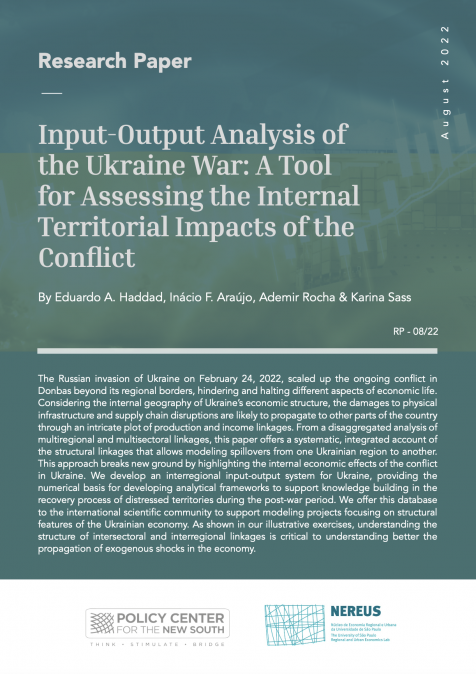Publications /
Opinion
Elon Musk, owner of the electric car company Tesla, declared in February that his company would accept the digital currency Bitcoin, as a payment method. The news lifted the shares of the carmaker by around 20%. Three months later, Musk reversed his decision, sold 10% of his Bitcoin holdings and raked in the modest sum of $100 million. Economist and Senior Fellow at the Policy Center for the New South Henri-Louis Vedie noted in his Policy Brief, Bitcoin, a Speculative Virtual Currency Yet Not an Alternative to Fiat Currency that “what has happened is confirming the highly speculative character of the cryptocurrency”.
Bitcoin is the leading cryptocurrency but it is just one of an estimated 5000 digital currencies, including Ethereum, Binance Coin, Polkadot and Tether. Digital currency is a virtual commodity. In other words, it does not exist. The truth is there is no ‘mining’, no extracting of a secret metal by some slaves digging deep into the earth. Bitcoin is mined via “computational means” (Investopedia), suggesting arithmetic calculations and highly complicated financial movements, which drive investors into psychiatric care or to order a custom made yacht. In his paper, Vedie explains: “The algorithm authenticates transactions and controls related monetary transfers, regularly ensuring blockchain integrity. While originally performed by a PC, this is no longer the case, as miners have replaced PCs. Miners are not people, nor institutions, but increasingly large and powerful servers dispersed around the globe. Mining is therefore the provision of computing power, now reaching unprecedented levels, driven by cutting-edge technology. And this, to solve incrementally sophisticated problems, due to encryption key complexity and ever-increasing transaction volume”.
For many the digital currency is just like gold. There is no Big Brother watching the transactions, and no sympathetic broker, who will guide you towards the timely moment to buy or sell. All a Bitcoin loser can do is scream or curse. Giant computers, placed around the world, calculate the value of the coins, limited to a total of 21 million, of which about 18.3 million are in circulation. The estimated value of Bitcoins in 2021, noted Henri-Louis Vedie in his detailed and timely Policy Brief, is $1000 billion. Just a reminder, on its introduction to the market, one bitcoin was worth $0.001. In the first three months of this year, Bitcoin doubled in value.
Not long after the first Bitcoin was launched (2009), noted the Wall Street Journal (June 18, 2021), “crooks recognized its appeal”. Terrorists use cryptocurrency to pay for arms and explosives, the Mafia to launder money, mercenaries to transfer funds to buy arms, secretive governments, such as North Korea, to receive aid from allies in the darkness of cyberspace. In a 2019 paper, researchers reported that an estimated 46 percent of Bitcoin transactions conducted between January 2009 and April 2017 were for illegal activity, according to the Wall Street Journal.
Predictability is Not Part of the Marketing
In the last five years the value of Bitcoin has surged more than 5700%, tempting figures indeed, but stability and predictability are not part of the cryptocurrency’s marketing. Those daring to invest in cryptocurrencies must be immune to volatility. In April 2021, Bitcoin registered its highest value ever, $64,900, but then crashed (May 19) to about $30,000. On June 17, newspaper headlines said “Bitcoin is nosediving today”. For much of the past decade, said Australian ABC business editor Ian Verrender (May 2, 2021), “crypto devotees have predicted the demise of fiat currencies, the system by which individual nations run different currencies”. They argued that “the rise of the internet and the arrival of digital currencies would bypass traditional payment methods and undermine the network of central banks that regulate and run the global financial system”. Henri-Louis Vedie observed growing interest on the part of institutions, money exchange firms and industries, thus “strengthening its volatility”. Questions are raised by economists about whether Bitcoin and/or other cryptocurrencies could eventually replace the system of global gold reserves. The UK watchdog the Financial Conduct Authority, reported the Economic Times (June 18, 2021), said that “more people see crypto assets as a mainstream investment rather than a gamble, as ownership of Bitcoin and similar cryptocurrencies has risen to 2.3 million adults in Britain this year”. Bitcoin is increasingly becoming more mainstream after payment giant PayPal announced in October that it would let users buy and sell cryptocurrency on its platform.
Once reluctant bankers such as BNY Mellon have taken the plunge, noted Ian Verrender, by forming a crypto division, while JP Morgan “has dipped its toe into the water in an effort to keeps its clients happy”. Some cryptocurrency enthusiasts may get cold feet these days since the media reported dramatic news (on June 20): “Crypto crash as China steps up crackdown on Bitcoin mining industry” (Suban Abdulla, Yahoo-Finance). On the same day, from Beijing, Christian Shepherd, informed his Financial Times readers that China’s largest Bitcoin-producing provinces have intensified a crackdown on cryptocurrency mining in “the latest sign of how global authorities are toughing their stance on the rapidly growing digital asset markets … The country’s Bitcoin mining operation, the power hungry process of computational puzzle-solving that creates new units of the virtual currency, have been in retreat since May when the government confirmed a ban on crypto- transactions and warned of the risks of using them for payment”. China’s latest intervention, reported the Financial Times, comes at a time when many governments are scrutinizing the industry’s affect on the environment and determining the types of financial oversight that should be applied to cryptocurrencies. Earlier this month, the paper’s Beijing correspondent recalled, “global regulators called for digital currencies to carry the toughest bank capital rules of any asset, with the Basel Committee on Banking Supervision warning that the growing use of crypto assets has the potential to raise financial stability concerns”.
The opinions expressed in this article belong to the author.










